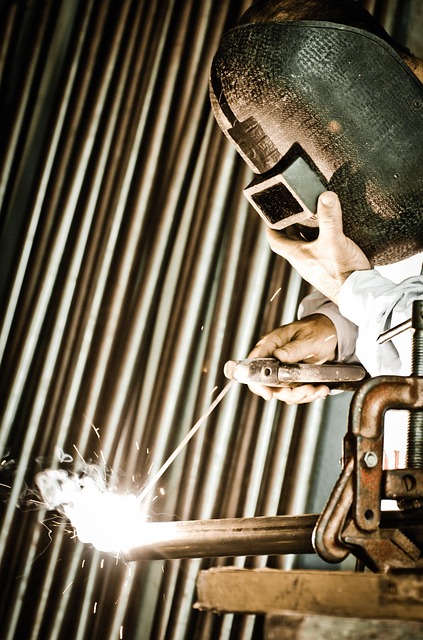Welding Company Jobs in Ireland: A Trade with Stability and Opportunity
Ireland's welding industry continues to flourish as infrastructure projects, manufacturing operations, and construction activities drive demand for skilled welders. With competitive salaries and opportunities for specialization, welding offers a stable career path with room for advancement. The combination of technical expertise, physical stamina, and attention to detail makes this trade both challenging and rewarding for those seeking long-term employment security.

Welding represents one of Ireland’s most enduring skilled trades, offering consistent employment opportunities across multiple sectors including construction, manufacturing, shipbuilding, and infrastructure development. As the country continues its economic growth, welding professionals find themselves in an increasingly advantageous position within the labor market. The combination of technical skill requirements, physical demands, and specialized knowledge creates a profession where qualified practitioners can build sustainable careers with competitive compensation.
Why the Welding Industry Is Expanding in Ireland
Ireland’s welding sector has experienced notable growth in recent years, driven by several key economic factors. The government’s continued investment in infrastructure projects—including road networks, bridges, and public transportation systems—has created sustained demand for qualified welding professionals. These large-scale projects require precision metal joining techniques that only trained welders can provide.
Additionally, Ireland’s position as a European manufacturing hub has strengthened the welding job market. International companies establishing operations across the country require skilled welders for equipment fabrication, maintenance, and specialized manufacturing processes. The pharmaceutical, medical device, and technology sectors particularly rely on precision welding for critical components.
Renewable energy represents another growth area for welding professionals. As Ireland pursues ambitious climate goals, the construction of wind farms, solar installations, and other renewable energy infrastructure creates specialized welding opportunities. These projects often require advanced techniques like pressure vessel welding and specialized material joining methods.
What Welding Jobs in Ireland Include
Welding positions in Ireland encompass diverse responsibilities depending on the specific industry and employer. Core duties typically involve preparing materials by cleaning and aligning components, studying blueprints and specifications, and selecting appropriate welding methods for particular applications. Welders must maintain and adjust equipment while adhering to strict safety protocols throughout all processes.
Many welding roles require proficiency in multiple welding techniques, including MIG (Metal Inert Gas), TIG (Tungsten Inert Gas), stick welding, and flux-cored arc welding. The ability to work with various metals—steel, aluminum, stainless steel, and specialized alloys—increases employability across different sectors.
Beyond the physical welding work, professionals must conduct quality assurance checks, maintain detailed documentation, and collaborate with engineers, project managers, and other tradespeople. In more advanced positions, welders may supervise junior staff, contribute to project planning, or specialize in highly technical applications like underwater welding or automated welding system operation.
Key Skills for Success in Welding Careers
Technical proficiency forms the foundation of any successful welding career in Ireland. Employers seek candidates with formal qualifications such as certificates from recognized training institutions or apprenticeship completion credentials. The ability to read and interpret technical drawings, understand metallurgical principles, and apply appropriate welding techniques to different materials is essential.
Physical attributes also play a significant role in welding success. The profession demands manual dexterity, good hand-eye coordination, and physical stamina. Welders often work in challenging positions—sometimes in confined spaces or at heights—requiring bodily control and comfort with physical demands over extended periods.
Safety consciousness ranks among the most critical skills for welding professionals. Understanding and implementing proper safety protocols, including the use of personal protective equipment, ventilation requirements, and fire prevention measures, protects both the welder and those working nearby. The ability to recognize potential hazards and address them proactively distinguishes exceptional welding professionals.
Career Advancement Opportunities in Welding
The welding profession offers multiple pathways for career progression in Ireland. Entry-level positions typically involve working under supervision on straightforward projects, but with experience, welders can advance to specialized roles with greater autonomy and higher compensation. Certification in advanced techniques or specialized applications—such as pressure vessel welding, pipeline welding, or aerospace applications—opens doors to more technically demanding positions.
Many experienced welders transition into leadership roles, becoming team supervisors, quality control inspectors, or welding instructors. Others establish their own contracting businesses, particularly in specialized niches where demand exceeds supply. Technical sales positions with welding equipment manufacturers or distributors represent another career path for those with extensive practical experience who seek less physically demanding work.
Continuing education plays a crucial role in advancement, with many employers supporting skills development through additional certification courses. Professional organizations like the Irish Welding Association offer resources, networking opportunities, and recognition programs that can accelerate career progression.
Training and Certification Requirements
Formal education for welding careers in Ireland typically follows several established pathways. Traditional apprenticeships remain popular, combining on-the-job training with classroom instruction over approximately four years. Technical colleges and further education institutions offer certificate and diploma programs ranging from basic welding techniques to advanced specialized applications.
Certification requirements vary by employer and specific role, but common credentials include those from Quality and Qualifications Ireland (QQI) and internationally recognized certifications from organizations like the International Institute of Welding. These qualifications verify competence in specific welding processes and positions, with more advanced certifications commanding higher compensation.
Safety certifications complement technical qualifications, with many employers requiring training in confined space entry, working at heights, and general construction site safety. As automation increases in the industry, familiarity with robotic welding systems and computer-controlled equipment is becoming increasingly valuable for career advancement.
Prices, rates, or cost estimates mentioned in this article are based on the latest available information but may change over time. Independent research is advised before making financial decisions.
The Future Outlook for Welding Professionals
The outlook for welding careers in Ireland remains positive, with technological advancements creating both challenges and opportunities. While automation has changed some aspects of the profession, the need for skilled human welders persists, particularly for complex applications, custom fabrication, and repair work. The integration of digital technologies—including augmented reality training systems and computer-aided design—is transforming how welders prepare for and execute their work.
Sustainability initiatives present new opportunities as Ireland transitions toward renewable energy and greener infrastructure. Specialized welding techniques for energy-efficient buildings, electric vehicle charging infrastructure, and renewable energy installations create niches for forward-thinking professionals. Similarly, the growing emphasis on circular economy principles increases demand for repair welding and refurbishment services.
For those considering entering the field, welding offers a stable career path with tangible results and the satisfaction of creating lasting infrastructure. While the work can be physically demanding, the combination of technical skill, problem-solving, and craftsmanship provides intellectual stimulation alongside practical application. As Ireland continues to develop its infrastructure and manufacturing capacity, skilled welders will remain essential contributors to the nation’s economic growth.




